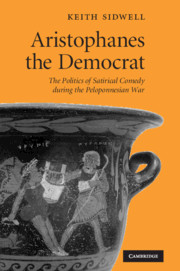Book contents
- Frontmatter
- Contents
- Detail of illustration
- Preface
- Acknowledgements
- List of abbreviations
- PART I SETTING THE STAGE
- PART II THE POETS' WAR
- Conclusions and consequences
- PART III APPENDICES
- Appendix 1 The view from the theatron
- Appendix 2 Metacomedy and caricature in the surviving fourth-century plays of Aristophanes
- Appendix 3 Timeline and proposed relationships between comedies
- Appendix 4 The date of Eupolis' Taxiarchoi
- Appendix 5 Clouds 868–73 and τραυλίζω
- Appendix 6 Michael Vickers on Strepsiades and Pericles
- Bibliography
- Index
- Index Locorum
- Index of Modern Scholars
Appendix 2 - Metacomedy and caricature in the surviving fourth-century plays of Aristophanes
from PART III - APPENDICES
Published online by Cambridge University Press: 27 January 2010
- Frontmatter
- Contents
- Detail of illustration
- Preface
- Acknowledgements
- List of abbreviations
- PART I SETTING THE STAGE
- PART II THE POETS' WAR
- Conclusions and consequences
- PART III APPENDICES
- Appendix 1 The view from the theatron
- Appendix 2 Metacomedy and caricature in the surviving fourth-century plays of Aristophanes
- Appendix 3 Timeline and proposed relationships between comedies
- Appendix 4 The date of Eupolis' Taxiarchoi
- Appendix 5 Clouds 868–73 and τραυλίζω
- Appendix 6 Michael Vickers on Strepsiades and Pericles
- Bibliography
- Index
- Index Locorum
- Index of Modern Scholars
Summary
Aristophanes continued writing for some twenty years after the success of Frogs. His last two extant plays are Ecclesiazusai (late 390s) and Wealth (388), the second of that name, the first having been produced in 409/8 (Σ Wealth 179). Despite the lack of many of their choral lyrics (the position of which is marked in the mss by the legend ΧΟΡΟΥ), the plays conform in the essential aspects of their plots to the format of his earlier plays. They also have in common with each other the political theme of wealth and poverty, though the approach of their plots is very different, the first based on a philosophical idea – communism – the second on a quirk of the divinely ordained lot of man – the blindness of Wealth and his consequent inability to go to the righteous. Their closeness in time and their shared concerns make it likely that in different ways both plays are responding satirically to the same stimuli (though a similar one was presumably also present when the first Wealth was produced during the war in 408, if it was anything like the later play). However, they have always been read – like Aristophanes' earlier plays – as though the fantasy were wish-fulfilment rather than a construction built around the desire to ridicule the individuals shown bringing it to pass.
- Type
- Chapter
- Information
- Aristophanes the DemocratThe Politics of Satirical Comedy during the Peloponnesian War, pp. 337 - 340Publisher: Cambridge University PressPrint publication year: 2009



